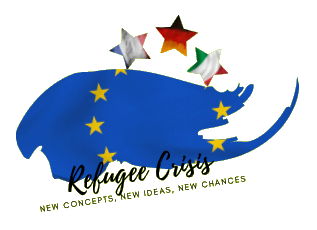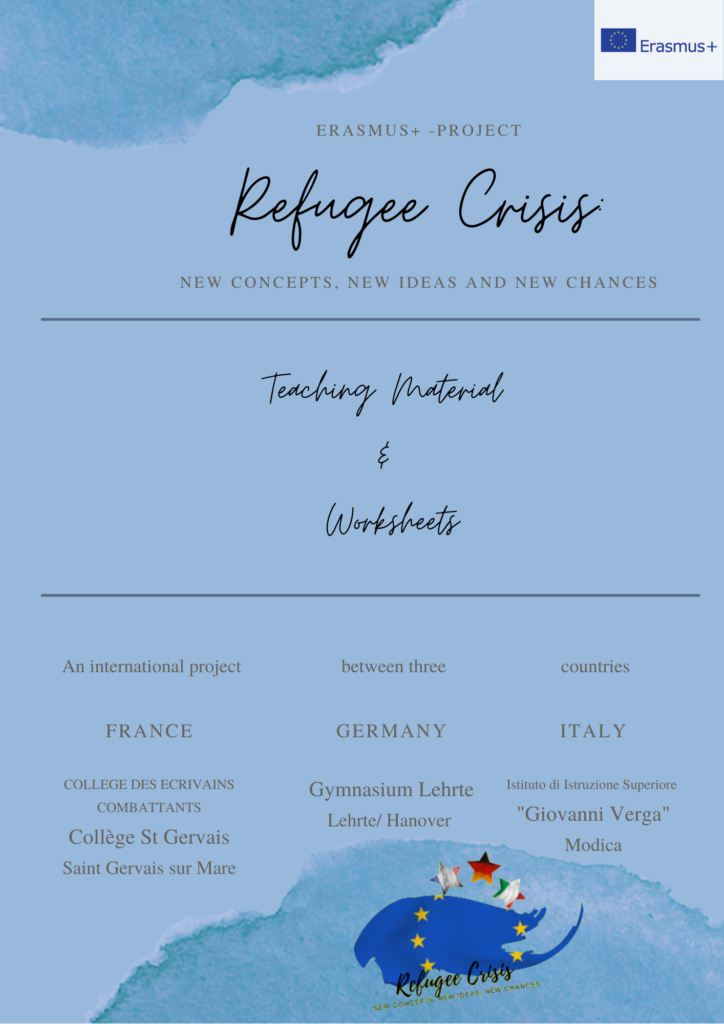Are you a teacher who wants to address the refugee crisis with your students in the classroom?
Do you want to promote an in-depth view of the situation of refugees among your students so that they can deal with integration processes critically and multidimensionally?
The principle of this website is a simple one: for teaching purposes, you will find not only teaching materials, but also our results under the individual modules.
Depending on the focus of your lessons, you can teach the modules separately from each other. Or you can follow our procedure.
If you create more materials with your own class, we would like to invite you to share them with other colleagues on our website and add to our collection.

In this module, they will foster an initial political understanding of the context on an international level. With the help of the material and our findings, you can encourage your students to critically question political mechanisms, preconditions and restrictions. You will promote a comparative, solution-oriented view of countries and train the necessary political, social and civic skills.
You can find our results on the download page.
Here you can find provided material to support you in the mediation process:

1st module: De jure: the EU coping with integration — law and politics)
During this mobility we dealt with the guiding question for C1 “How does the EU and how do the single states within the EU deal with the challenges of the current refugee crisis?”. In preparation for this, we took a closer look at the refugee policies of the three nationalities and the EU itself.
For in-depth exploration, we trained our students’ research skills by giving them specific guiding questions and topic areas, which they should edit. Their media skills and presentation skills were also trained in regular meetings.
We trained the international comparative view during the international meeting. In a comparison of all participating countries, they contrasted national policies with the EU policy and discussed similarities and differences. We also discussed various aspects that the different policies addressed.
Therefore, the students created short podcasts and interviews. In these fictitious interviews, they discussed challenges and opportunities of the refugee crisis from the perspective of politicians.
2nd module: De facto: regional focus on social integration concepts of local authorities and integration programs in our schools
The second module compared and evaluated the different integration approaches of local authorities and our schools. The selected projects and measures focused on different aspects of successful integration, such as language, housing, employment and financial support. We analyzed not only the challenges of integration processes, but also the problems faced by the projects themselves, such as bureaucracy, funding and resources.
We compared our results based on our national research during our first day at the second international meeting and took the opportunity to create a questionnaire which enabled an international focus on the flagship projects that were to be visited. Thus, the research on projects in Italy and France could continuously be critically questioned and compared by our students.
3rd module: Private integration initiatives and NGOs: Hanover, Montpellier, Modica
During the national working phase, the studentsscrutinized private integration programs and NGOs in their local surrounding, discussed their way of working and their key to success. In particular, we focused on advantages of private initiatives that complement the work of local authorities — can private programs/ NGOs step in where local authorities can’t due to their limitations? They prepared presentations in the form of short video clips or Prezi presentations to introduce their selected flagship projects.
During the international meeting, we discussed the benefits and the challenges of their strategies as well as criteria to motivate and inspire students to engage themselves to social projects as well. We had the opportunity to discuss these aspects with a volunteer from a local NGO that aims at integrating former refugees into local communities from the area. In the dialogue that emerged, we also discussed the difficulties of volunteering and social engagement and what it meant to actively participate in an NGO.
4th module: Labor market integration and access to vocational training
During this online mobility, we discussed the challenges and chances of integrating refugees in the labor markets of three countries: France, Germany and Italy/Sicily.
The students worked with various regional projects and measures. We talked with private companies about the challenges and requirements of private companies, with which they were confronted in the attempt to integrate refugees in everyday working life.
Based on the presentation of the different systems of labor market initiatives, the students reflected upon the advantages and disadvantages of each system. The students included the results in a common questionnaire.
The Mock Debate: A trinational project to improve the integration in the labor market
Based on this, we designed a mock debate to design a trinational project between the three countries to improve the integration of refugees in the labor market. Therefore, the participants designed concrete role cards for delegations of each country and developed a concrete project proposal as well, which included a solution-oriented, cooperative view of the individual circumstances, strengths and weaknesses of the three countries.

5th module: Summary and evaluation
During this online mobility, we concluded by discussing our project, critically examining the knowledge, facts, and information we gained, as well as our findings.
As a summary of the project, students were asked to answer the guiding questions of the four modules as well as summarize general information about the subject-based sectors in each country. For the international perspective, students worked together in internationally mixed groups. The presentation was edited by materials, results and photos of each mobility, which at the same time served as an in-depth summary discussion.

Our philosophy of the project is that we are at our best when we are willing to learn from each other. For this, the exchange with each other is essential.
New Ideas, New Results and New Materiales
If our material has inspired you and you add some new aspects and materials for your own work, we would be very happy if you provide us with your results and materials for the website and contact us!